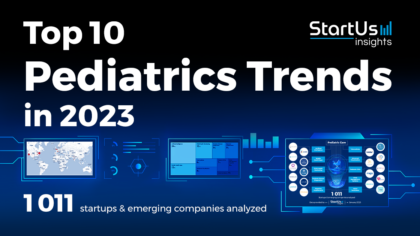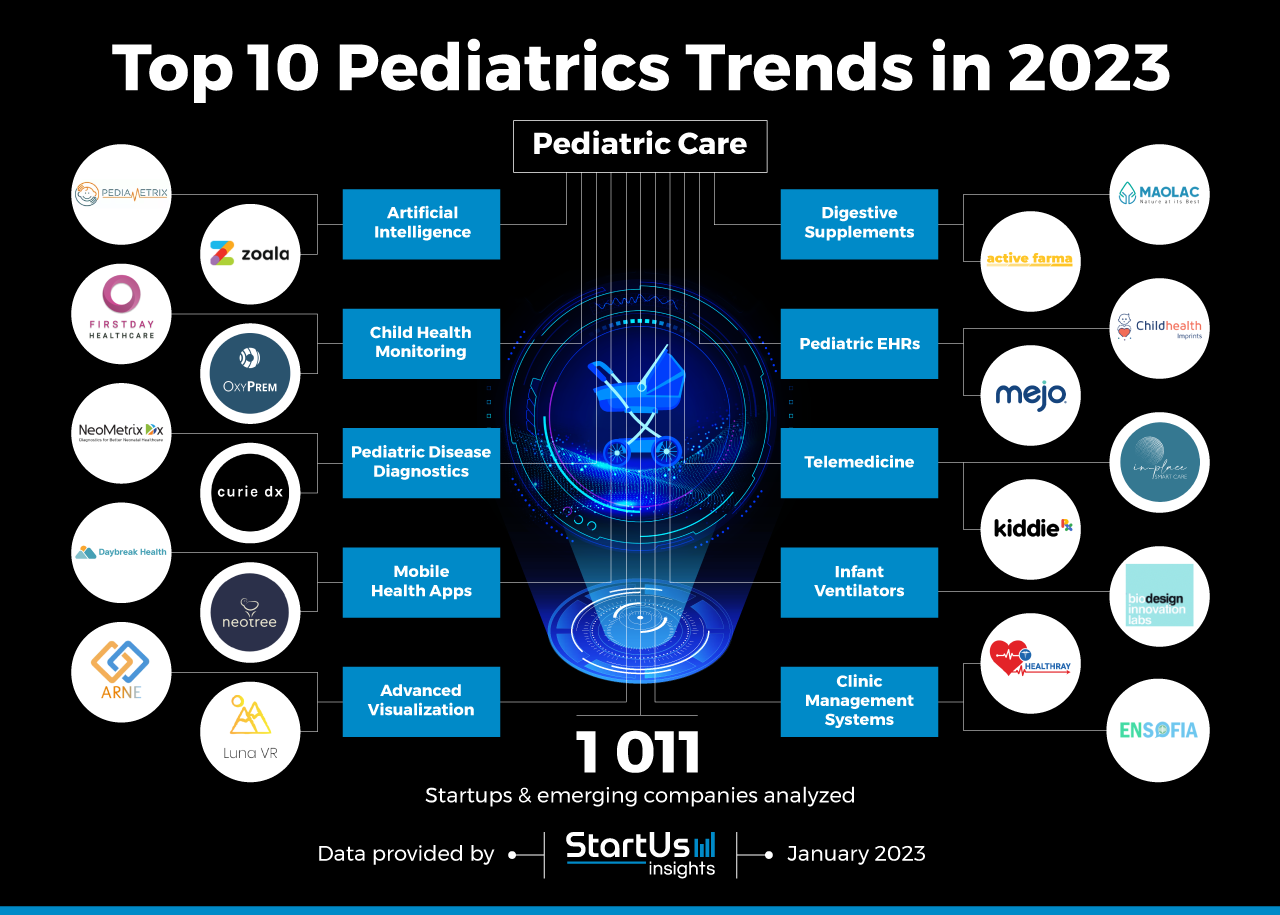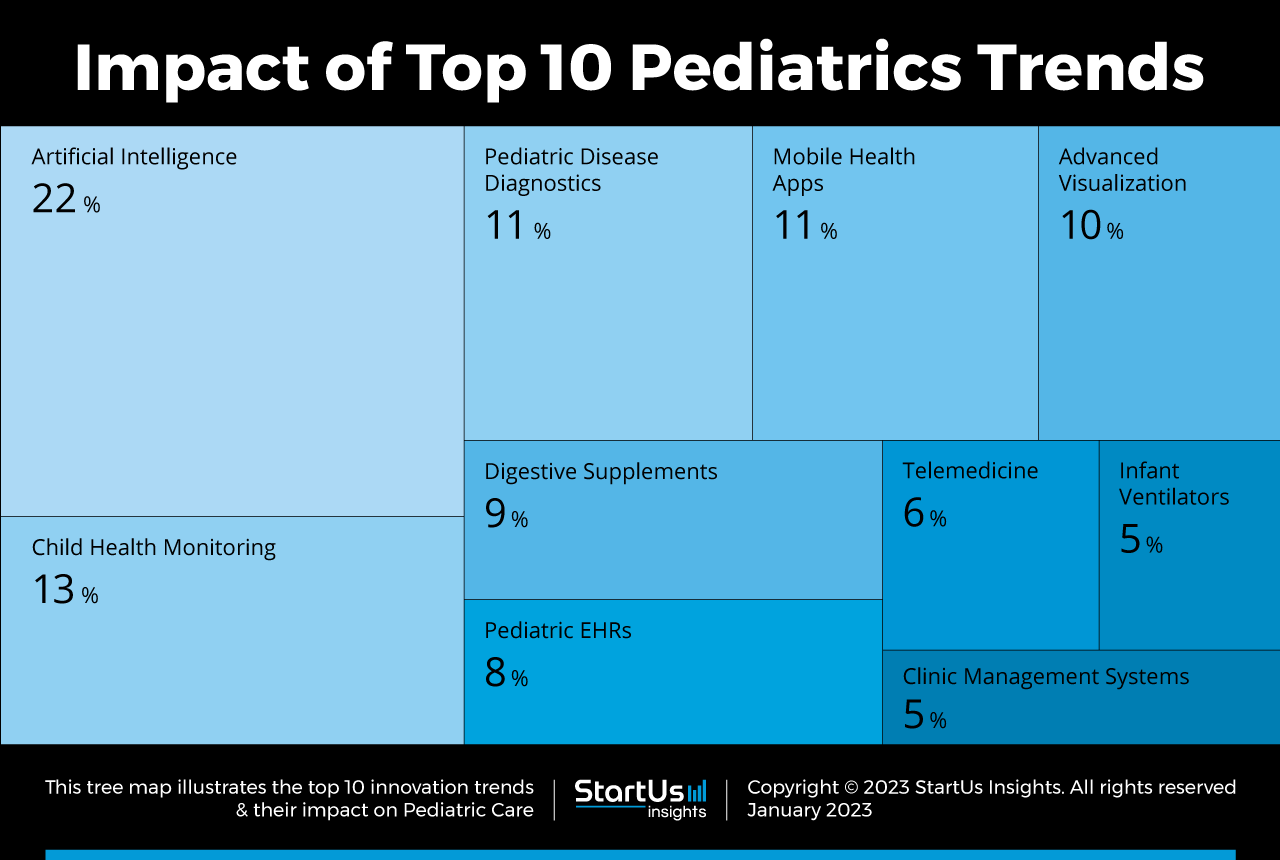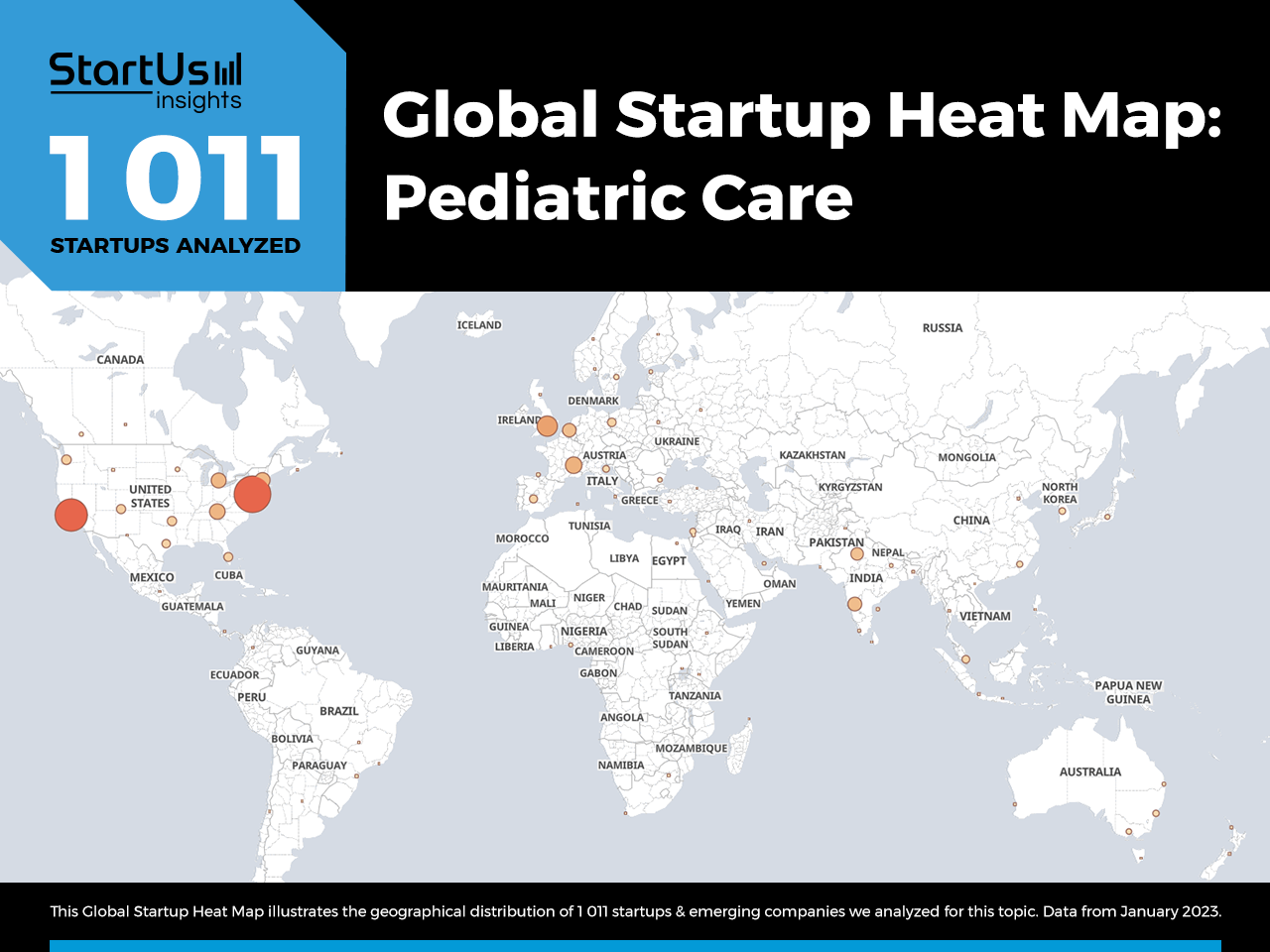Child health and safety is a growing concern among parents and healthcare institutions. Continuous and effective treatment of diseases and improving child well-being are also crucial for their upbringing. Advances in pediatrics, such as child health monitoring and telehealth, make child care easier and more efficient. This research provides you with the top 10 pediatrics trends that improve child health. They range from novel infant care and advanced diagnostics to artificial intelligence (AI) and cloud computing. Read more to explore the other trends and how they impact your healthcare business.
Innovation Map outlines the Top 10 Pediatrics Trends & 19 Promising Startups
For this in-depth research on the Top Pediatrics Trends & Startups, we analyzed a sample of 1 011 global startups & scaleups. The result of this research is data-driven innovation intelligence that improves strategic decision-making by giving you an overview of emerging technologies & startups in the healthcare industry. These insights are derived by working with our Big Data & Artificial Intelligence-powered StartUs Insights Discovery Platform, covering 3 790 000+ startups & scaleups globally. As the world’s largest resource for data on emerging companies, the SaaS platform enables you to identify relevant startups, emerging technologies & future industry trends quickly & exhaustively.
In the Innovation Map below, you get an overview of the Top 10 Pediatrics Trends & Innovations that impact 1 011 companies worldwide. Moreover, the Pediatrics Innovation Map reveals 19 hand-picked startups, all working on emerging technologies that advance their field.
Top 10 Pediatrics Trends
- Artificial Intelligence
- Child Health Monitoring
- Pediatric Disease Diagnostics
- Mobile Health Apps
- Advanced Visualization
- Digestive Supplements
- Pediatric EHRs
- Telemedicine
- Infant Ventilators
- Clinic Management Systems
Tree Map reveals the Impact of the Top 10 Pediatrics Trends
Based on the Pediatrics Innovation Map, the Tree Map below illustrates the impact of the Top 10 Pediatrics Trends in 2023. Startups and scaleups are developing AI-based solutions to accelerate disease diagnosis and provide decision support for clinicians. Novel infant care systems, like infant ventilators and disease diagnostics systems, also increase the survivability of newborns. Clinic management systems (CMS) streamline pediatric care facilities while telemedicine enables the remote delivery of healthcare services. At the same time, mobile healthcare apps aid child health tracking and improve health awareness. Advances in the internet of things (IoT) and wearables also make child health monitoring easier and cost-effective. Along with AI, clinicians leverage advanced visualization and modeling to improve visibility into patient conditions and avoid manual errors. Lastly, startups are providing digestive supplements for children to improve their gut health.
Global Startup Heat Map covers 1 011 Pediatrics Startups & Scaleups
The Global Startup Heat Map below highlights the global distribution of the 1 011 exemplary startups & scaleups that we analyzed for this research. Created through the StartUs Insights Discovery Platform, the Heat Map reveals that the US sees the most startup activity.
Below, you get to meet 19 out of these 1 011 promising startups & scaleups as well as the solutions they develop. These pediatrics startups are hand-picked based on criteria such as founding year, location, funding raised, & more. Depending on your specific needs, your top picks might look entirely different.
Top 10 Pediatrics Trends in 2023
1. Artificial Intelligence
AI utilizes the data from electronic health records (EHRs) and other patient data to provide insights into patient conditions and diseases. In pediatrics, AI significantly improves pediatric diagnosis and reduces pseudocyesis. It also aids in predicting mortality rate, survival chance, and preterm birth. Further, AI-driven virtual assistants provide personalized wellness content and mental health support for children. For developing these solutions, startups leverage machine learning or deep learning. Apart from this, AI finds applications across pediatric care departments to accelerate data processing workflows and automate operations like child monitoring and patient scheduling.
PediaMetrix provides Computer Vision-powered Child Monitoring
US-based startup PediaMetrix leverages AI and computer vision for child head measurement and monitoring. The startup’s app, SoftSpot, offers access to reliable and accurate measurement tools at the point of care through image processing and machine learning. Physicians and patients upload images and videos for which the app generates reports, thereby enabling timely clinical interventions.
Zoala develops an AI-powered Mental Wellness Companion
Singaporean startup Zoala provides an AI-powered mental wellness companion app. It detects mental stressors and helps in building mental resilience. The startup’s app also supports adolescents on their mental health journey and in building strength. It then generates specific insights and provides recommendations to support teachers, schools, and parents. This allows them to take early action at structural and personal levels.
2. Child Health Monitoring
Child monitoring provides health-related data to doctors and parents, aiding in child disease treatment. For this, startups offer wearables, such as smart watches, garments, and headgear, that identify sleeping patterns, heart rate, and more. Additionally, smart pills use sensors to provide prescription timing data to doctors. Healthcare professionals and startups leverage gamification to improve patient engagement and simplify data acquisition. Such solutions reward children for following healthy behaviors and adherence to medication while offering tasks to enhance their mental health.
OxyPrem makes an Oxygen Monitoring Headgear
Swiss startup OxyPrem manufactures headgear for brain oxygen monitoring in newborns. It is a non-invasive reusable tissue oximeter that uses near-infrared spectroscopy (NIRS) to determine hemoglobin oxygen saturation in real time. The startup’s headgear thus improves survival rates for high-risk preterm patients.
Firstday Healthcare simplifies Remote Patient Monitoring
Firstday Healthcare is a US-based startup that develops a remote patient monitoring app. The startup utilizes wireless sensors to send data on vital signs, such as respiratory rate, heart rate, temperature, and oxygen saturation, to a gateway tablet using Bluetooth. The data is stored in the cloud and relayed to the startup’s command center platform and parent smartphone apps. This allows hospitals to ensure child safety even after discharge and decrease readmission rates while allowing parents to easily transition from NICU to home.
3. Pediatric Disease Diagnostics
Timely detection of diseases in children is crucial to mitigate high-risk scenarios and ensure their safety. To aid this, startups develop pediatric disease diagnostics solutions from imaging technologies and blood tests to AI and genetic testing. For instance, genetic tests allow lab personnel to identify genetic mutations associated with certain diseases or conditions, like sickle cell disease or Down syndrome. Point of care and portable diagnostics devices are also gaining interest among care providers and parents, decentralizing and accelerating care delivery.
NeoMetrix Dx offers an Automated In-Vitro Diagnostic Device
NeoMetrix Dx is a US-based that develops AL4 Dx, an automated in-vitro diagnostic device. It integrates a robotic pipetting system and a multi-wavelength spectrophotometer for testing total and unbound bilirubin. The startup also utilizes a patented proprietary algorithm to offer clinical insights into newborn bilirubin binding characteristics. This allows clinicians to accurately diagnose the neonatal risk of Hyperbilirubinemia cost-effectively.
CurieDx enables AI-driven Medical Diagnosis
CurieDx is a US-based startup that advances AI-driven image-based medical diagnosis. The startup’s smartphone app allows parents to upload photos of their children to provide instant screening for common diseases like fevers, rashes, or sore throats. This allows families to mitigate unwanted distress. The startup also enables physicians and telehealth providers to improve care delivery by integrating its solution into their telehealth platforms.
4. Mobile Health Apps
Mobile health apps provide access to health information through devices like smartphones and other handhelds. Healthcare institutions utilize health-tracking apps and wearables to collect patient data. With wireless connectivity and mobile devices, pediatricians receive updates on critical child health data, enabling quicker diagnoses and eliminating errors. Such apps also offer learning simulations through real-life scenarios that promote positive decision-making, feelings, and thoughts in youth. Further, startups develop apps that deliver personalized content based on children’s needs to promote a healthy lifestyle.
Daybreak Health provides a Teletherapy Smartphone Application
US-based startup Daybreak Health develops an online teletherapy app. It enables on-demand access to various youth-specialized clinicians who provide personalized treatment to improve mental health. The app’s evidence-based care programs aid stress management, academic performance, and more. Further, the platform enables clinicians to create their profiles based on specialty areas and connect with children to provide treatment.
Neotree improves Quality of Infant Care
UK-based startup Neotree provides an android app to improve the quality of infant care. The mobile app integrates with clinical workflows and guides healthcare professionals to do relevant checks when babies are admitted or discharged from neonatal wards. This data is then available for hospital administrators and clinicians to monitor trends over time and drive diagnostic decisions and clinical management.
5. Advanced Visualization
Advanced visualization techniques in pediatric care leverage augmented reality (AR) and virtual reality (VR). This enables physicians and surgeons to visualize intricate body structures and conditions as well as provides critical medical information. At the same time, 3D visualizations allow physicians to study organ defects more efficiently and find use in staff training and child engagement. For instance, navigating virtual real-life medical scenarios using immersive technologies enable healthcare institutions to better train new recruits and improve their confidence. Further, visualization solutions advance distraction and pain management, patient education, and behavioral therapy for pediatric care.
ARNE offers AR-based Vitals Monitoring
Dutch startup ARNE provides an AR-based vitals monitoring device for neonatal care. It monitors the baby’s vital parameters, such as temperature and heart rate, in real-time. The device also records audio input from doctors and then processes this data using a newborn life support (NLS) protocol. The startup’s physician support system processes real-time clinical parameters to indicate the next treatment steps. This eliminates physician errors and increases the survival rates of infants.
Luna VR delivers VR-based Pain & Fear Management
Canadian Startup Luna VR uses VR to decrease fear and pain responses in children. Children wear a VR headset and see age-appropriate interactive characters instead of needles and other medical procedures. In this way, patients get distracted from medical procedures in clinics and hospitals.

6. Digestive Supplements
Digestive supplements for children improve their gut health and immunity. Vitamins and minerals are the top ingredients among emerging milk and new infant milk formulas. Also, parents’ concerns around fertilizer and pesticide residues in food drive interest in organic nutrition. Other digestive supplements further allow parents and care providers to deliver nutrition even if breastfeeding is not possible, improving infant health.
Moalac makes Plant & Animal-Derived Food Supplements
Israeli startup Moalac offers plant and animal-derived functional proteins biosimilar to breast milk. They strengthen the health and personal well-being of infants. The startup’s functional proteins also feature high immunity and biocompatibility, as well as are added to a variety of foods and supplements.
Active Farma manufactures Vitamins, Minerals, & Proteins Supplements
Italian startup Active Farma produces supplements for adolescents and children. They restore the body’s natural functions to ensure a balanced and healthy life. The startup’s product, immunoYES, has active ingredients required to maintain the normal balance of the immune system. Its other product, SOSflogo, aids children and adolescents in situations where anti-inflammatory support is needed.
7. Pediatric EHRs
Digital health records of children provide visibility into their health history, including vaccinations, illnesses, and treatments. This data is critical for physicians to improve disease diagnostics and tailor care delivery. For example, pediatric electronic health records document the allergens that patients are reactant to. This allows pediatricians to avoid medications that may trigger an allergic reaction. Further, pediatric EHRs eliminate manual errors and simplify data sharing. Digital records also aid research and population health management. For this, healthcare institutions utilize AI or machine learning to analyze pediatric EHRs and identify patterns and trends for promptly detecting outbreaks and developing new treatments.
Child Health Imprints creates Cloud-based Pediatric EHRs
Singaporean startup Child Health Imprints makes iNICU Intelligence, a cloud-based pediatric EHR platform. It integrates with bedside clinical observations and laboratory results and then analyzes the data in medical comprehensive reports leveraging machine learning. This enables doctors and nurses to reduce manual errors and provide live child health data by generating auto-discharge summaries and disease predictions.
mejo offers a Digital Child Health Journal
US-based startup mejo creates a web-based digital child health journal app. Its curated questionnaire allows caregivers and families to capture childcare information to track their medical journey. The app also organizes the child’s health data for easy access and allows them to share it with medical professionals through text messages or emails, saving time.
8. Telemedicine
The COVID-19 pandemic accelerated the adoption of telemedicine in the healthcare sector. It has a wide range of uses such as online patient consultations, remote monitoring, telehealth nursing, and remote physical rehabilitation. Patients and doctors save travel time and cost with telemedicine while improving emergency care. Many startups are providing web portals and mobile applications for healthcare professionals and patients to enable real-time communication and ensure timely care delivery.
IN-PLACE Smart Care develops a Telerehabilitation Platform
Italian startup IN-PLACE Smart Care makes a telerehabilitation platform for remote treatment during the developmental age. Its video consultation service allows patients suffering from neurodevelopmental disorders to connect with pediatricians and child neuropsychiatrists. In addition, the platform uses cloud-based storage for sharing medical records with pediatricians.
KiddieRX makes a Pediatric Telemedicine App
KiddieRX is a US-based startup that offers a pediatric telemedicine app. It is a virtual assistant that connects parents and patients with licensed pediatricians through video chats. This allows parents and caregivers to ensure timely care delivery for children. Additionally, the startup delivers prescriptions within a few hours.
9. Infant Ventilators
Conditions like birth depression, neonatal encephalopathy, and pulmonary diseases cause respiratory distress in infants and premature babies, leading to a high mortality rate. That is why the pediatric care industry is leveraging smart infant ventilators, high-frequency oscillatory ventilation (HFOV), non-intensive solutions, and more. For instance, smart infant ventilators feature sensor-driven closed-loop feedback systems that deliver oxygen based on newborn conditions. This reduces complications and improves outcomes. Additionally, portable infant ventilators allow care providers and parents to ensure patient safety in high-risk scenarios.
Biodesign Innovation Labs makes a Smart Mechanical Ventilation Device
Biodesign Innovation Labs is an Indian startup that makes RespirAID, a low-cost, smart, and portable mechanical ventilation device. It provides volume control ventilation for patients in emergency rooms, ambulances, and postoperative care. The device also displays breath rates, tidal volume, and peak inspiratory pressure in real-time as well as features safety alarms to notify healthcare professionals of emergency situations. This allows pediatricians and physicians to replace manual ventilation in intensive care units (ICUs) and ensure timely care delivery.
10. Clinic Management Systems
Integrated information systems combine various aspects of childcare clinic operations such as medical, financial, administrative, and legal segments. As a result, clinic management systems provide a broader view of clinic operations and allow administrators to quickly find inefficiencies. Such centralized systems also enable them to avoid errors and ensure a single source of truth, improving transparency. Further, CMS functions as a clinical decision support system (CDSS) as it delivers mission-critical data to admins. Apart from hospital or clinic management, pediatric CMS allows physicians to increase patient engagement by providing relevant health information and improving care delivery.
Healthray makes an AI-enabled Healthcare Practice Platform
Healthray is an Indian startup that provides an AI-enabled healthcare practice platform. It combines online doctor consultation, patient management, online doctor appointments, e-prescription, and EHR systems. This also enables pediatricians to improve clinic management, billing, outpatient management, and more. Consequently, the platform enables pediatricians to transition to online healthcare practice without expensive in-house product development and treat more patients.
EnSofia improves Patient Engagement
EnSofia is a US-based startup that develops a patient engagement platform. Its natural language conversational AI handles common patient tasks such as appointment management and prescription refills. The AI interacts with patients and customers while the platform also combines voice, video, and text to enable and streamline omnichannel communication. As a result, it creates automated medical pathways for pediatric clinics, allowing pediatricians to boost patient engagement and increase clinical profitability.
Discover all Pediatrics Trends, Technologies & Startups
Advances in pediatric care technologies continue to improve the accessibility and quality of care for children. Telemedicine, remote patient management, and imaging diagnostics will further improve care delivery for children. Finally, genomics and precision medicine enable healthcare institutions to personalize healthcare and improve treatment outcomes. Other solutions, like AI, machine learning, and immersive technologies, will further improve clinical decisions.
The Pediatrics Trends & Startups outlined in this report only scratch the surface of trends that we identified during our data-driven innovation & startup scouting process. Among others, genomics, AI, and remote monitoring will transform the sector as we know it today. Identifying new opportunities & emerging technologies to implement into your business goes a long way in gaining a competitive advantage. Get in touch to easily & exhaustively scout startups, technologies & trends that matter to you!











